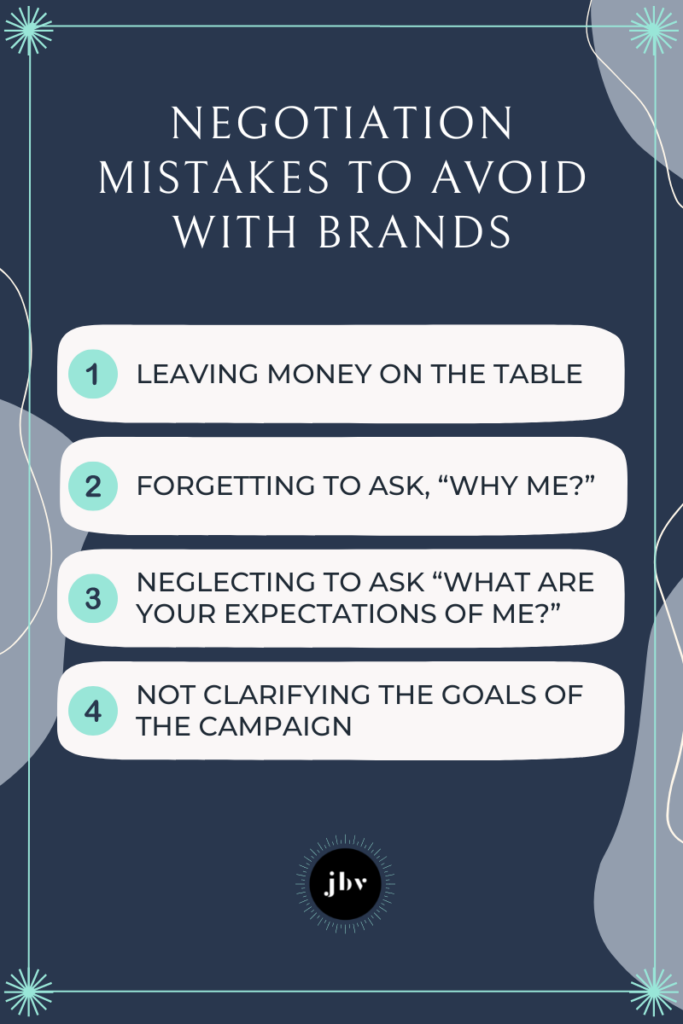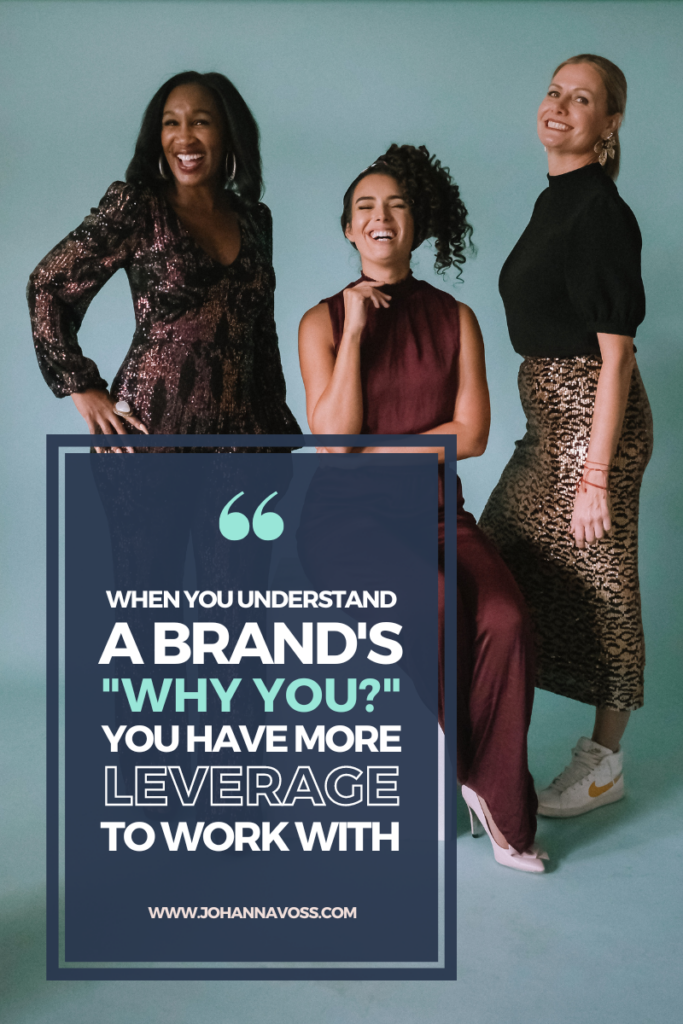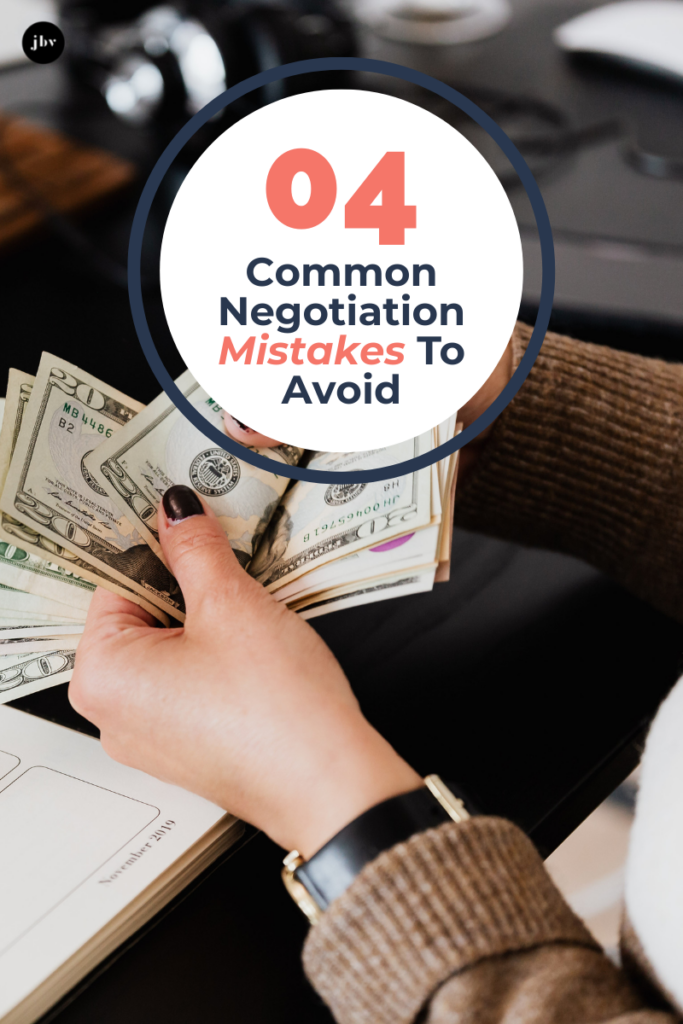4 negotiation mistakes to avoid with brands
Today, we’re going to talk about the 4 biggest negotiating mistakes to avoid that I see women make when they start to work with brands and my best advice on how to avoid them. Whether you’re a veteran of the Social Media Influencer industry or you’re a freshly minted inductee, I have a feeling you already know: it is HARD WORK!
From figuring out how to develop an editorial calendar to consistently creating content, understanding the importance of SEO to juggling relationships with brands, there’s a lot going on.
While I can’t claim expertise in all the many facets of your influencing career, one thing I AM an expert at is negotiating with brands. When you hit the point of being able to hire an Influencer Manager like myself, we’ll take care of all the nitty-gritty for you.
But what if you’re still a solopreneur navigating the choppy waters by yourself? You have to be your own best advocate! Until we get a chance to work together, I’m here to help educate you on how to protect your best interests.
Negotiation mistakes to avoid with a brand checklist
Mistake #1: Leaving Money On The Table
We’ve all heard the awful statistics that even as of 2020, women earned just 82.3 cents to every dollar earned by men. That’s not even taking race and ethnicity into account. Women of color have it worse: on average Black women earn just 64 cents and Hispanic women earn just 57 cents to the dollar. And gals? That’s for the same work. Things have to change!
While I’m not here to victim blame (and I fully support wage transparency), there is something that women — especially badass freelancers like yourself — can do to close the gap. ASK.
It might sound scary, but as working women, it is our duty to ask for our due. I know societal influences have groomed us to think of talking about money as gauche but lemme tell you a little secret: men do it all the time!
And guess what? Brands expect to be asked about things like their budget. They expect for you to negotiate with them. If they come in with an offer that feels too low, you don’t have to take it!
So, what’s your next step? Counter with another offer. Negotiate the SOW (“statement of work,” i.e. what your deliverables would be). Shrink the usage of how they want to share your content. Ask what flexibility is possible. If they can’t budge on the price, can they shorten the window of time for exclusivity and the list of companies on it? Look for creative ways to align on the project —including both the budget available and the work required of you — so that both sides are happy. The last thing you want is to start a project feeling resentful of what you agreed to.
Need some help with your negotiation skills? Check out my article on how to get better at negotiating.

Mistake #2: Not Asking, “Why Me?”
One of the first things I suggest you ask of anyone who is proposing to work with you is: how’d you find me? Why are you attracted by my content? What caught your eye? In asking this question, I’ve often learned of a new top ten list such as the Best Mexican food creators to follow that highlights a client of mine.
When you understand their “why you,” you suddenly have more leverage to work with. For example, if they are after your followers, consider sharing the ins and outs of your community that are selling points to the brand, i.e. what do you know about your community’s habits, desires, wants, and needs?
Knowing who they are looking to reach gives you leverage if you can deliver that specific audience. Even better is if you can show how engaged your community is and demonstrate their hunger for the information/trip destination/recipe hack/product the client offers.
Or, if the company is a fan of your photography, see if you can simply sell them a photo package to make the contract better worth your while without any social obligations on your platforms.
In addition to being able to better negotiate your contract with this particular brand, knowing how the brand found you will also help you to acquire more brand partnerships. As they say, knowledge is power!

Mistake #3: Not Asking “What Are Your Expectations Of Me (Or This Partnership)?”
Make sure you get a very clear picture of what the brand is asking before agreeing to anything. You know the whole adage about assuming, right? Something about making a donkey of you AND me? In this case, I hate to tell you, but you’ll end up the bigger donkey here.
While you’re a freelancer working out on your own, those big brands have a lot of people- and firepower behind them. If they determine you’re not fulfilling your end of the contract, chances are they already have a whole legal team waiting to spring into action.
If you assume that the company would be happy with a single post on a single channel, but they were really expecting multiple posts (both static and video) across multiple channels over a set period, well, that’s just not the same thing!
When the contract isn’t explicitly laid out with exactly what you are creating and posting (blog, social content for IG, a TikTok, or something else), it’s really hard to argue your case in your favor. And make sure to quantify everything, even down to the number of IG story frames.
If you haven’t done your due diligence to know what the brand is asking of you before you sign the dotted line, they can string you along and continue to make demands far beyond the scope of what you *thought* you had agreed to.
So, be sure to ask in no uncertain terms: what are your expectations of me for this contract? Have them list out every single deliverable that you are responsible for.
As an added bonus, this clearly itemized list will help you assign a reasonable dollar value to the total package! When you know their ask, you can assess the amount of your time and energy they are demanding and make sure that you’ll be paid commensurately.

Mistake #4: Not Asking About The Goals Of The Campaign
When you enter into an agreement with a brand, make sure you’re aware of their goals. Is this campaign about conversions or brand awareness? Because the approach to a brand awareness campaign is far different than one designed to get people to act on your call to action.
Knowing if the brand is looking for app signups/downloads or new customers is great if you’re awesome at converting or making sales with your links. If you have case studies and analytics that back up your case, use them. Conversely, if that’s not your strength, it’s good to know to avoid those partnerships.
They also may not know your capacity, so it’s up to you to spell it out for them. If they want a piece of SEO copy but you’re a photographer or videographer, you should let them know that they may need to source that piece elsewhere. Honesty with yourself and with the brand is key to your continued success.
TL;DR?
As you start your journey working with paid brand partnerships, the most important thing to remember is to go into it with your eyes wide open. That means asking lots of clarifying questions so that you fully understand the project and proposed scope of work.
Make sure you’re covering your booties here, ladies. It’s not that brands are out to get one over on you, but it is literally their goal to make as much profit as possible. For companies with shareholders, it is their legal obligation to maximize shareholder profits – even to the detriment of their freelancers.
That means they aren’t going to offer up the best rates in the first round of negotiations. They’ll try to get the most work out of you for the lowest amount possible. This isn’t a bad thing, per se, but it’s something you need to know in order to maximize your earnings and create a comfortable working environment for yourself.
If you are able to perform the duties outlined in your contract, you will inspire the trust of the brand. It’s that simple!
The goal here is to set yourself up for success so that you can continue working with the brand going forward. Remember, lasting professional relationships are the bread and butter of profitable influencing.
Until next time, I leave you with a powerful quote:
“You get life what you have the courage to ask for.” ~ Oprah Winfrey

Pro tip : If you’ve loved this article, I highly recommend you sign up for my weekly newsletter HERE. It’s full of industry insights, brand negotiation tips and scripts, events I’m attending, perspective on how to grow your Influencer business and more. I keep it pretty scrappy and real – would love you to join us over there! CLICK HERE TO SIGN UP.
Negotiation mistakes to avoid with a brand FAQs
What are common mistakes in negotiating?
Luckily for you, there are only a few common negotiation mistakes. I shared my top four above and can elaborate on what often leads to those negotiation mistakes. At the end of the day, it always comes down to communication, or really, miscommunication.
To be a successful negotiator, don’t be afraid to ask questions and ask for what you want and need! Move past the small talk and chatter as quickly as possible (although it’s always great to lean into relationship-building, so don’t wave it off completely) and get to the real bones of the business deal. Make sure you’re thinking of things that matter to both you (as either the influencer or talent manager) and the agency wanting to hire the talent.
When a successful negotiation happens, both parties feel like they’ve gotten a fair — or, ideally a great — deal. And this all stems from asking great questions to help you understand the project scope. What deliverables does the client want? What budget they are offering for the project? What’s the timing? Oh, and don’t forget about the usage and exclusivity rights.
Whenever I’m negotiating on behalf of any of my clients, I always approach the bargaining table (a.k.a. my emails and phone because, let’s be real, it’s all virtual these days) with my eyes wide open. This means bringing no expectations about how it will unfold, leaving my emotions on the side (because it’s never personal), and being prepared about what optimal outcomes could stem from my negotiations.
What is the main rule/Golden Rule in negotiation?
My Golden Rule in negotiation is to communicate and ask questions! The biggest mistakes I always hear about when influencers share their negotiation horror stories is that they didn’t ask questions.
The best thing you can do is come to the negotiation table with a set list of questions to better understand the project. If a brand is coming to you and wants to partner with you, it’s on you to interview them to best understand what you’re saying yes (or no) to. Whether you’re negotiating for a new job, a better salary, or a brand ambassadorship, come prepared to ask detailed questions about what the offer is.
What exactly is the offer? What’s the pay associated with the offer? What are the expectations about the project or job responsibilities?
The negotiation process is where all these conversations about specifics (most importantly the money and expectations details) happen. By the time you get to the agreement phase, ideally there are no surprises.
A strong negotiator can pivot and follow up well. A good negotiator also understands that a successful negotiation process often takes time.
One of my good friends often says “I didn’t change my mind. I got new information and made a different decision.” I think about this quote often when negotiating. I’m gathering information to make the best decision on behalf of my client.
It does take solid negotiating skills to be able to respond and flow with your counterpart as they share information that is surprising or maybe not the best deal for your client. And remember, like any skill, negotiation takes lots of practice.
At the end of the day, communicate communicate communicate. That’s it. I’ve said it multiple times already in this article and I’ll die on this hill! Open communication is the key to a successful, effective negotiation.
What are the do’s and don’ts of a negotiation process?
- Do go into the conversation open-minded (and stay open-minded through the process).
- Think through some of the different scenarios that may unfold.
- As you learn more details about the brand ambassador opportunity or client project, be prepared to revisit what you think is a great deal or best alternative. Let’s say you ask a question about having additional budget and the brand replies with a no, remember that it doesn’t mean no to the entire thing, only no to that one question. So you go back to the drawing board.
- Get creative about ways to find the next best solution where everyone is happy.
As you’ve heard me say a million and one times, ask loads of questions — they are your friend! TBH, asking questions is my “secret weapon” to having awesome negotiation skills. You want to have a super clear idea of what “it” is that you’re saying yes to.
Also, while you may not have time on your side, DON’T feel pressured to make a decision.
What are some common reasons negotiations fail? What are the main reasons why negotiations fail?
Negotiations typically fail because one or both parties didn’t effectively communicate. Perhaps emotions got in the way, or one party felt rushed for time to get to a deal. But the BIGGEST mistakes of a poor negotiation I often attribute to miscommunication. Here are some of the most common “fails”:
- People are rude. Kindness always wins and speaking from my experience in the influencer marketing world as a talent manager
- People are dishonest (Influencers, don’t ever lie about your work experience or rates or anything. The internet always has receipts!)
- People are disrespectful and/or shady. Don’t ever go behind someone’s back.
- People are emotional. Gotta remember, it’s never personal.
Another reason negotiations have poor outcomes, especially in the influencer marketing world, is that people fail to remember it’s all a collaboration. Ever take game theory? This is NOT a win-lose situation. Both parties should win.
Finally, make sure to your due diligence before the negotiations start. Speaking as a talent manager, make sure you’re up to speed on what your client’s rates are, what sort of availability they have, and if they’d even be open to a collaboration with the brand that’s reaching out. If you’re an influencer negotiating on your own behalf, it doesn’t hurt to have a quick check in with yourself and look at your calendar.
Don’t ever assume anything about the project or any of the specifics. Not sure? Ask a question! I totally understand that it’s hard not to take the negotiations personally. But please believe me when I say, it never is!
Let’s say as an influencer you ask for $20k for a scope of work and the brand counters with $15k or even a no, It doesn’t mean anything other than they aren’t open to offering $20k for the scope. That’s it. It doesn’t mean they don’t like you. It doesn’t mean they don’t value your work. It doesn’t mean they’ll never reach out to you again. Leave your emotions aside. It’s strictly a business negotiation. (This is also why it’s great to have a talent manager but I’m guessing you might already know that!)
I’ll leave you with a couple of things to remember as you either start negotiating for the first time or are looking to up your skills:
The current negotiation that you’re working on isn’t just about the here and now. Be smart and strategic. Remember that these are opportunities to build good relationships with possible future partners of yours.
It takes a great deal of time, energy, and patience to become a skilled negotiator so don’t lose sight of that as you chat with people. You’re going to make some common mistakes and that’s okay. You’re human. (Although, if you’re open to getting better at negotiation, I’ve got you covered with this article including “5 tips for negotiating better”.)
Being a successful negotiator is one of the life skills I think everyone should have, but not everyone will be good at it. That makes it more fun for those of us who are good at it AND enjoy it! The only way to show up to your future negotiations as a skilled negotiator is to flex that muscle now and just practice practice practice.
